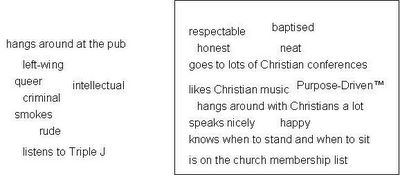That is what I'm supposed to be talking about Friday morning at New Life Centre's Bible school, in Warrnambool. They asked Trav to, but he can't, so he asked me to.
Our experiences of evangelism influence our understanding of evangelism. We develop the way we evangelise based on how what we have seen work or fail in other situations. What positive and negative experiences of evangelism have you had?
Scripture Union has ten principles of conversion:
Holy Spirit is responsible for conversion
'And we know that in all things God works for the good of those who love him, who have been called according to his purpose. For those God foreknew he also predestined to be conformed to the likeness of his Son, that he might be the firstborn among many brothers. And those he predestined, he also called; those he called, he also justified; those he justified, he also glorified.'
Romans 8:28-30
'No one can come to me unless the Father who sent me draws him, and I will raise him up at the last day. It is written in the Prophets: "They will all be taught by God." Everyone who listens to the Father and learns from him comes to me.'
Jesus, John 6:44-45
If it is God that brings people to himself, then what's our role?
If we can leave the responsibility of changing people to God, we can also concentrate more on
our own relationships with God.
Kids are different to adultsKids aren't able to respond to God in the same way that adults do.
For example, younger kids usually find it hard understanding abstract ideas. For example, last year when Trav was a Religious Education teacher, a lot of the kids reckoned that God was a person, a kind of superhero.
However, just because kid is unable to understand the human ideas about God doesn't mean that they can't have a relationship with God. In the scripture I quoted earlier, Jesus refers to
Isaiah's prophecy:
'All your sons will be taught by the Lord,
and great will be your children's peace.'
Isaiah 54:13
This implies that God is already in a relationship with a person before they can
understand him. In that case, perhaps we need to provide an environment where kids can experience God and continue to learn from him.
Darren Wight has post on this
here.
We need to avoid manipulationI think that's pretty obvious. I think this is particularly relevant in helping
kids and teenagers respond to God.
Why
do you think people use manipulation? Would they necessarily think they are being manipulative? Could any of
our evangelistic methods be seen as manipulative?
Children are concrete thinkersAs I mentioned earlier, most kids have a hard time understanding abstract ideas. This can make it hard for them to understand the Bible, because it wasn't written for children, so it contains a lot of abstract stuff. So how do we explain the content of the Bible with kids?
Kids are part of familiesOften we forget that kids are part of families, and that this has implications on conversion. For example, if a kid's parents don't want them to go to Sunday school (or whatever) there's not much the kids can do about it. Conversely, sometimes parents send their kids to the Scripture Union Family Mission program in Warrnambool even though they don't want to go.
Kids need to respond individuallyIt's no good if a kid decides to 'respond' simply because all of their peers do.
RelaxWe need to be relaxed when helping other people respond to God. This isn't easy. It helps to remember the first principle - that it's not up to us to
make someone respond to God.
Conversion is a processA lot of the time we see God's kingdom as being like a farm with a fence. We see each person as being inside of outside the farm by whether or not they display different characteristics that we see as 'Christian'. This way of understanding God's kingdom means that we see it as our task to get people who aren't Christians onto the inside of this fence.
In the desert the farms are so big that fences aren't very useful. Instead, the farmers dig deep wells, because they know that the animals won't go to far away from their source of water.
We can look at God's kingdom like this. Instead of regarding each person as either inside or outside the kingdom, we can look at in terms of how close they are to the centre of the kingdom (Jesus) and whether they are getting closer or further away. This model acknowledges that every decision a person makes is important, as in bringing someone closer to God.
Earlier in the year I did a more in-depth post on this
here.
Males should counsel males; females should counsel femalesObviously, so it doesn't look like there's anything dodgy going on.
Presume nothingJust because someone responds in some way (at an altar call or whatever) doesn't necessarily mean they've decided they want to be a Christian. It might be that their dog died, and they want to talk to someone about it. We need to find out what they want.




